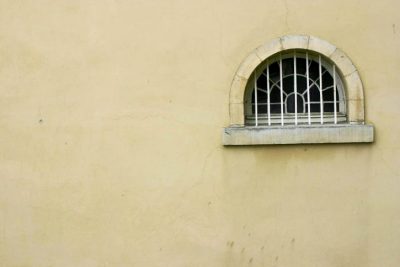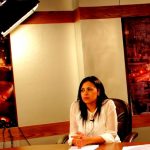By Shahd Bani-Odeh
“Don’t fall in love with a Palestinian Israeli ID holder” the annoyingly monotonous voice in my head.
What if I did and felt it first hand? I would definitely be one of those affected by the unjust circumstances of occupation and discriminatory laws to be separated according to the type of citizenship I carry, very much similar to the Khatib Family.
The Khatib couple (Taiseer and Lana) are one of the couples I met to document my short film. I met two families who were affected by the Israeli parliament’s decision, one in Akka and the other in Haifa. My objective was to track their stories and highlight the human impact of Israel’s discriminatory law (“Citizenship and Entry into Israel Law (temporary order)”.
This law prevents the reunification of Palestinian families where one partner holds an Israeli citizenship (Palestinian who lives in the occupied territories of 1948 “Israel”) while the other is a resident of the Palestinian territory (West Bank), thus depriving these families of their civil, economic and social, health and other rights.
Taiseer Khatib is from Akka and his wife Lana Zaroure is from Jenin. They’ve been forced by the unjust circumstances of the occupation and discriminatory laws to be separated according to the type of citizenship they carry.
“Akka is my everlasting love, my everlasting passion, there is no way to leave the sand grains of Akka and let it go to strangers. I know the history of Akka’s stones and rocks, my name would never be detached from Akka.” Taiseer al khatib said denouncing the idea of moving to Jenin, the city his wife Lana is from.
Lana currently has a temporary permit to stay with her husband Taiseer and her children. The temporary permit allows her to stay with her husband and their two children but denies her every other right such as the right to drive, to work, to get an education and to access healthcare
“I got a permit for one day to visit a relative in a hospital and in this permit I went into Akka and made my wedding party then I was supposed to come back to Jenin.” Lana explained how she managed to get married.
Later, Lana was given a ‘temporary permit’, which is renewed every three months and is the only way to stay with her husband Taiseer in Akka.
Prior to getting the temporary permit, Lana was supposed to hide from the police for fear of being forced to leave Akka.
Since the beginning of the second Intifada, the Palestinian uprising against Israeli military occupation”, Palestinian ID Holders were not allowed to enter Israel.
Several years later the Israeli government began giving Palestinians permits to enter Israel for medical purposes only. Thus, as a Palestinian woman from Nablus, this meant that I cannot enter Israel but I was lucky enough and managed to enter illegally and there was the beginning of my story.
My experience of living in one of the most conflicted parts of the world not only made me aware of the world’s injustices but made me passionate about sharing my people’s stories. This however requires a double effort when it comes to a Palestinian Journalist, since I would inevitably witness lots of events that will mark my own personal experience.
A very long queue of Israeli ID holders and foreign residents were waiting to be searched at the checkpoint which is connected to Haifa’s main train station. They looked satisfied and at ease and I thought to myself “Why would they look otherwise! They are completely allowed to pass through the checkpoint and take that train which was heading to Lod.”
It was then that I realized I was about to get caught. since I was there ‘ illegally’.
As I advanced in the line with my turn approaching, my thoughts were racing as my tongue grew heavier;I knew I was completely trapped.
What would I give them? My Palestinian ID? What would I say if they asked how would I dare still be here now? How would my first detaining experience be?
My turn came up, I wasn’t prepared enough but I was ready to face the fact. Well, I had not committed any crime. My only sin was being Palestinian.
The two soldiers searched my bag carelessly. They didn’t ask for my ID or any official personal document. I was utterly relieved. I got on the train in a hurry although I couldn’t turn back and relive the past five minutes.
I was hardly able to drag myself around as I was burdened with my heavy camera and gadgets.
On my way back to Lod, Scenes were racing in my mind and flashing before my eyes, What a coincidence that I would be in a train that carries Israeli soldiers commuters! I held back tears and hid my pain, anger and frustration behind my sunglasses, How could I remove Abrar’s Face from my mind and the conversation I had with her when I shut the camera off and was about to leave? I was around those who are making Lana and Abrar’s life Hell.
Similar to Lana, Abrar who had been married to a Palestinian – Israeli citizen for 15 years, is denied her civil rights also; no car, no work, nothing.
It was then that Abrar called her son Benjamin. I stepped back and asked “Your son is Benjamin? Isn’t that a Hebrew name?”
Abrar: Yes, I know but my husband and I thought that we have to name our four sons with Hebrew names so we trick the racist Jewish state so my sons will be appreciated and treated well” explained Abrar.
Abrar recalled her bitter memories “The night that I went into labour, my husband and I made our way to the hospital. I was in severe pain. I arrived at the checkpoint and they wouldn’t allow me to pass through and I had to deliver my first baby in the West Bank; it was then when we have decided to name our sons with Hebrew names”.
It felt like a slap in the face, I came to document the everyday life of those struggling families and it turned out to be an exhausting self experience.
“Yes, don’t fall in love with a Palestinian Israeli Id holder; you can’t bear the ongoing humiliation of their daily life. Abrar and Lana are more courageous than you.” The same monotonous voice spoke to me once again.
Shahd A. Bani-Odeh
A Palestinian broadcast Journalist and field researcher, holds a B.A. in media, radio and television broadcasting and a master’s degree in new media and Journalism.
My initial desire to major in this field stemmed mainly from my experience living in one of the most conflicted parts of the world. My personal interest in it rises from my desire to share people’s experience in their everyday life with the rest of the world.



No Comments Yet!
You can be first to comment this post!